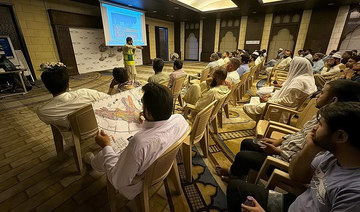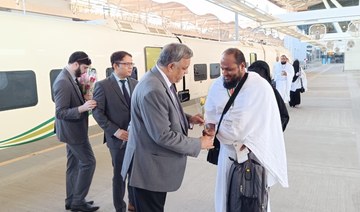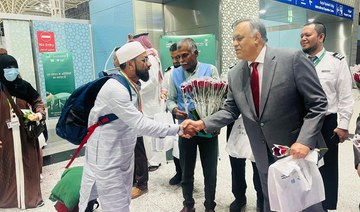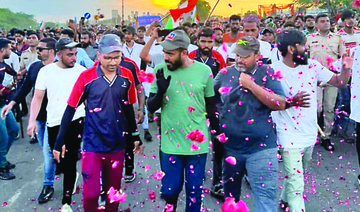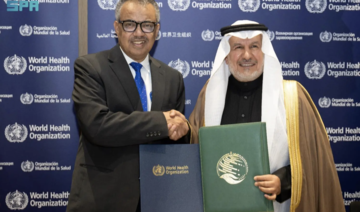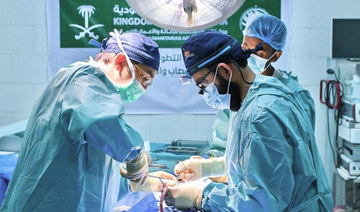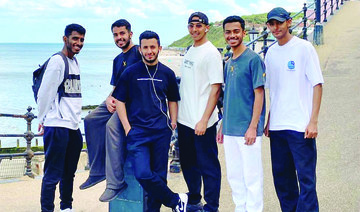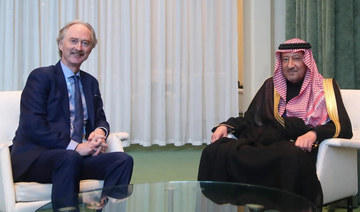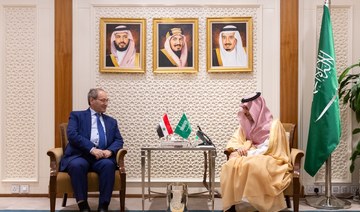NEW YORK: UN Secretary-General Antonio Guterres on Wednesday expressed hope that talks underway between authorities in Saudi Arabia and Iran will help to ease tensions in the Gulf region.
“I hope that the dialogue that started between Saudi Arabia and Iran, and other forms of dialogue in the region, will produce results and will allow a reduction of the tension in the Gulf,” he told Arab News.
It came as he reflected on the role the Kingdom, the UAE other Gulf nations can play in tackling global crises — including food insecurity, climate-related emergencies and energy shortages — and regional conflicts such as those in Syria, Yemen, Libya and between the Israelis and Palestinians.
“I am sure that (Saudi Arabia, the UAE and the entire Gulf Cooperation Council) will be quite active in relation to the promotion of peaceful solutions in their neighborhood: In Syria, Libya, Yemen or in any other country that is close to them,” said Guterres.
“I think the people of Syria, the people of Libya, the people of Yemen have already suffered too much. And my appeal is for everybody to come together to solve those problems.”
The UN chief also said he hopes that “GCC countries, which have a huge capacity for production, will contribute to (resolving) the energy crisis in the world.”
Turning to the latest developments in Libya, Guterres said that the supposed ceasefire there “is not in sight.”
He added: “It’s difficult to know what is the biggest challenge that requires action. We must preserve peace between (the rival authorities in the) east and west but that also means preserving peace in relation to the recent confrontations that happened in Tripoli.
“With the militias supporting either (Government of National Unity Prime Minister Abdul Hamid) Dbeibah or (Government of National Stability leader Fathi) Bashaga, we need hostilities (to stop.) That is fundamental.”
Guterres said that legitimacy remains a problem in Libya and he called for a quick agreement between the House of Representatives in the east of the country and the High Council of State that would allow the implementation of legal changes required for national elections to take place.
He urged external actors involved in Libya to “fully support the process of reconciliation” and back the political process that could lead to the election of a “legitimate government that everybody accepts.”
Speaking on Wednesday during a news conference to mark the start of the 77th Session of the UN General Assembly the previous day, Guterres, who had just returned from a visit to flood-ravaged Pakistan, prefaced his remarks with a striking message denouncing the “sheer inadequacy of the global response to the climate crisis” and urging the international community to take more-aggressive action to mitigate its effects.
Describing the ongoing “climate carnage” in Pakistan, which has so far resulted in the deaths of more than 1,300 people and caused damages estimated at more than $30 billion, Guterres said his trip to the stricken country was a “window into the future.”
He added: “A future of permanent and ubiquitous climate chaos on an unimaginable scale: Devastating loss of life, enormous human suffering, and massive damage to infrastructure and livelihoods.
“What is happening in Pakistan demonstrates the sheer inadequacy of the global response to the climate crisis, and the betrayal and injustice at the heart of it. It is simply heartbreaking.
“No picture can convey the scope of this catastrophe. The flooded area is three times the size of my entire country, Portugal.”
Guterres once again pointed out that although the greenhouse-gas emissions that cause the planet to heat up and its glaciers to melt are overwhelmingly produced by the world’s richest nations, it is poorer countries such as Pakistan that bear the brunt of resultant extreme-weather events and the death and destruction they bring.
“Whether it’s Pakistan, the Horn of Africa, the Sahel, small islands or the least-developed countries, the world’s most vulnerable — who did nothing to cause this crisis — are paying a horrific price for decades of intransigence by big emitters,” he said.
“G20 countries are responsible for 80 percent of emissions. If one-third of G20 countries was underwater today, as it could be tomorrow, perhaps they would find it easier to agree on drastic cuts to emissions.”
He warned that continued inaction now will cause occurrences of devastating weather events to multiply in the future. The repercussions, including instability and global mass migration, will be felt “for years to come,” he added
“My message to world leaders gathering here is clear: Lower the temperature — now. Don’t flood the world today; don’t drown it tomorrow,” said Guterres.
Geopolitical divides have never been so extreme, he added, and are paralyzing efforts to address global challenges.
“Our world is blighted by war, battered by climate chaos, scarred by hate and shamed by poverty, hunger and inequality,” Guterres said.
The human solidarity enshrined in the words of the UN charter is “being devoured by the acids of nationalism and self-interest, shocking disregard for the poorest and most vulnerable in our world, (and) by politicians who play to people’s worst instincts, for partisan gain.”
He concluded by reiterating the importance of offering hope to people.
“This year’s general debate must be about providing hope and overcoming the divisions that are dramatically impacting the world,” Guterres said.
“That hope can only come through the dialogue and debate that are the beating heart of the United Nations and that must prevail … against all divisions.”
UN chief expresses hope that Saudi-Iranian talks will help ease regional tensions
https://arab.news/zkmya
UN chief expresses hope that Saudi-Iranian talks will help ease regional tensions
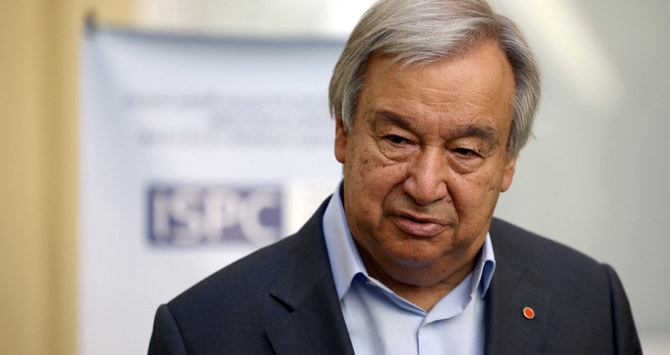
- Secretary-General Antonio Guterres told Arab News he is certain the Kingdom, the UAE and other Gulf nations have an active role to play in promoting peace in Syria, Yemen and Libya
- The ‘climate carnage’ in Pakistan shows that the global response to the climate crisis is inadequate, he said, and demonstrates the ‘betrayal and injustice’ that lies at the heart of it
Saudi ambassador to Guinea sees off first group of Hajj pilgrims from country
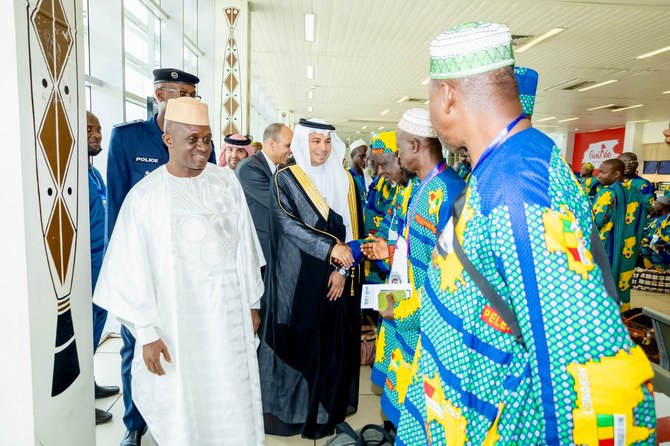
- Al-Rashidi said the Kingdom was fully prepared for Hajj
RIYADH: Saudi Arabia’s ambassador to Guinea Fahad Al-Rashidi on Sunday saw off this year’s first group of Guinean Hajj pilgrims heading from Conakry to the Kingdom.
Al-Rashidi said the Kingdom was fully prepared for the pilgrimage, during which millions of pilgrims from various parts of the world will perform their rituals in the best possible manner, Saudi Press Agency reported.
The ambassador said that due to God’s grace and the generous care and directives of the Saudi leadership, the Kingdom had mobilized its resources, personnel, and capabilities to ensure the comfort, security, and safety of pilgrims.
Indian Hajj pilgrims take train from Jeddah to Makkah
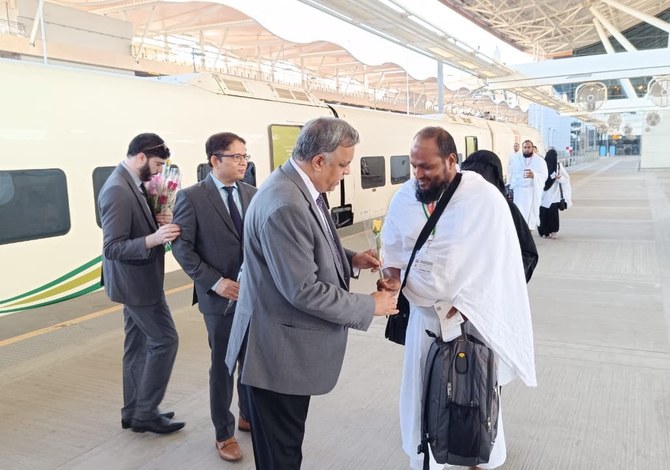
JEDDAH: Traditionally, all pilgrims arriving at Jeddah International Airport travel to Makkah by buses provided by Saudi authorities. This year, however, special arrangements have been made by the Consulate General of India in Jeddah, in tandem with the Saudi authorities, for some Indian pilgrims to travel via the Haramain High Speed Railway from Jeddah airport to Makkah.
About 32,000 Indian pilgrims will benefit from this exclusive service, reducing travel time by half thanks to the train’s maximum speed of 300 kph.
To commemorate the historic occasion, India’s ambassador, Dr. Suhel Ajaz Khan, and Consul General Mohd Shahid Alam accompanied Indian pilgrims on the inaugural journey from Jeddah airport to Makkah on Sunday.
The pilgrims arrived in the Kingdom on a Saudia flight from Mumbai.
They were joined by Khaled Al-Harbi, senior vice president of operations at Saudi Arabia Railways, as well as officials from the ministries of Hajj and Umrah, and transport.
This is the first time Saudi Arabia is transporting a limited number of Hajj pilgrims directly from Jeddah airport to Makkah by train.
This year, 175,000 pilgrims from India will participate, with 140,000 organized through the Hajj Committee of India.
KSrelief calls for coordinating humanitarian efforts with WHO
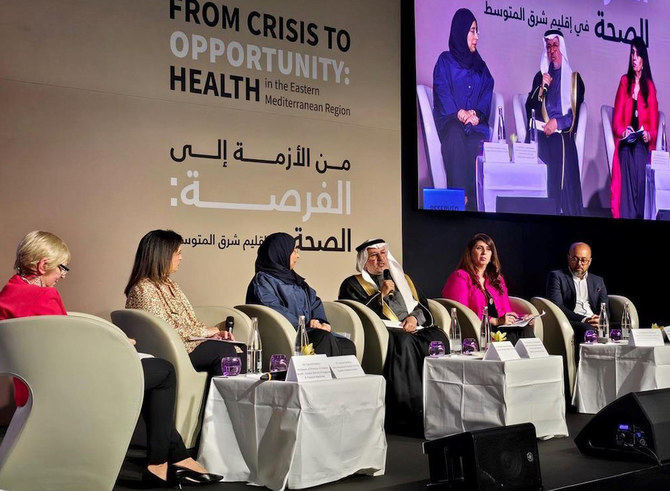
- Dr. Abdullah Al-Rabeeah urges international action amidst humanitarian crisis
RIYADH: Dr. Abdullah Al-Rabeeah, supervisor-general of Saudi aid agency KSrelief, said he wants to boost the partnership with the World Health Organization to improve and coordinate response efforts, ensure all resources are allocated efficiently, and enable communities to become more resilient and independent.
Speaking at a session titled “From Crisis to Opportunity: Health in the Eastern Mediterranean Region,” at the 77th World Health Assembly, held in Geneva, Switzerland, Al-Rabeeah thanked the WHO for efforts to address the humanitarian crises in the Eastern Mediterranean region, including conflicts, migration and economic instability.
He said that the Saudi leadership made intensive and generous efforts to alleviate the suffering of millions of people in need in the region and around the world, particularly children, women and vulnerable groups.
Al-Rabeeah said that the total humanitarian assistance provided by Saudi Arabia to the WHO Regional Office for the Eastern Mediterranean exceeded $1.4 billion. He added that KSrelief recently announced a $500 million contribution to efforts to eradicate polio over the next five years.
He mentioned that the center provides comprehensive health treatment and support services in humanitarian emergencies.
Furthermore, KSrelief has implemented various volunteer programs in the medical sector as part of its relief and humanitarian endeavors, including 298 projects worth over $46 million in the Eastern Mediterranean region.
Al-Rabeeah urged all parties in conflict areas to ensure that relief aid providers are allowed to deliver aid in a safe and effective manner.
When aid delivery is prevented and attacks on humanitarian workers and hospital staff are allowed, he said, those in need suffer even more. The situations in the Gaza Strip and Sudan are clear examples of this, he added.
Al-Rabeeah said that KSrelief works closely with its partners to overcome challenges and ensure the safe delivery of aid even under the most difficult circumstances. For instance, during the siege of Taiz in Yemen, the center used airdrops to deliver assistance and even resorted to camels to deliver medical supplies, oxygen cylinders and other urgent items to remote mountain locations where health services were either very limited or unavailable, he said.
In Gaza, the center succeeded in assisting with the area’s current challenges.
“Restricted access to Gaza has led to severe shortages of food, water, medical supplies and other much-needed items,” he said, urging restrictions be changed to save lives, especially those of children, women and the elderly.
Al-Rabeeah urged the international community to take decisive action to protect health facilities and humanitarian workers, and all authorities to abide by international humanitarian law.
He also called for involving healthcare workers in policy-making processes, to ensure that their expertise and experience are used to shape effective healthcare strategies.
Al-Rabeeah emphasized the crucial role of international collaboration in ensuring that all people in need have access to humanitarian assistance and medical care.
Harvard witnesses graduation of 60 Saudi students from elite US universities
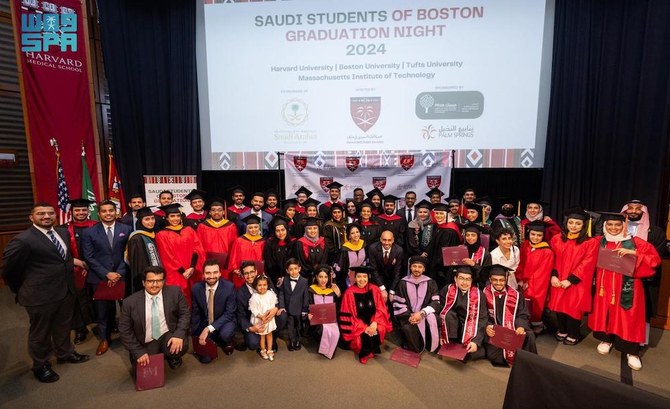
RIYADH: The Saudi Club at Harvard University recently organized a graduation ceremony for Saudi graduates from Harvard University, MIT, Boston University, and Tufts University.
The event took place on Harvard’s campus in Boston and was attended by Mohammed Khashaan, director of the public diplomacy department at the Saudi Embassy in the US, Saudi Press Agency reported.
During the ceremony, Khashaan said that the distinguished Saudi students are graduating in light of the transformations occurring under Saudi Vision 2030.
He highlighted the investment in the nation’s talented individuals, and said that the Kingdom is experiencing economic, industrial, and environmental growth, accompanied by renewed opportunities for its citizens to pursue their dreams, and contribute to building the future of the nation and the world.
Additionally, US Ambassador to Saudi Arabia, Michael Ratney, delivered a recorded speech in which he congratulated the graduating students and thanked the Saudi Club for organizing the event to celebrate their achievements.
“I have been in Saudi Arabia for only a year, and the professional and personal opportunities here have never been greater. Your country is rich in resources, but its most valuable asset is its human capabilities,” Ratney said.
He also highlighted the diversity he has observed in various fields, from filmmaking to video game development and space travel, and expressed his happiness at witnessing this growth.
Saudi Arabia appoints first envoy to Syria in more than a decade
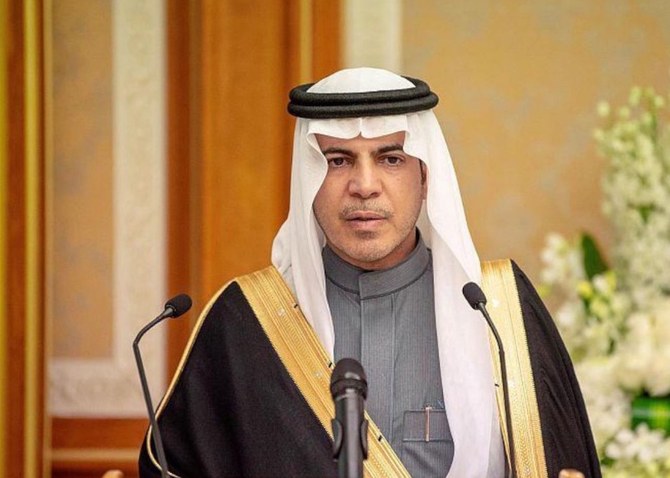
RIYADH: Saudi Arabia has appointed Faisal Al-Mujfel as the kingdom’s new ambassador to Syria, the Saudi Press Agency reported.
“The honored ambassador extends his thanks to the leadership on the occasion of his appointment as Ambassador to the Syrian Arab Republic,” SPA said.
Al-Mujfel is the kingdom's first envoy to Damascus since the closure of the Saudi embassy there in 2012 during the Syrian civil war.
Syria reopened its embassy in Riyadh last year and appointed a new ambassador in December.



